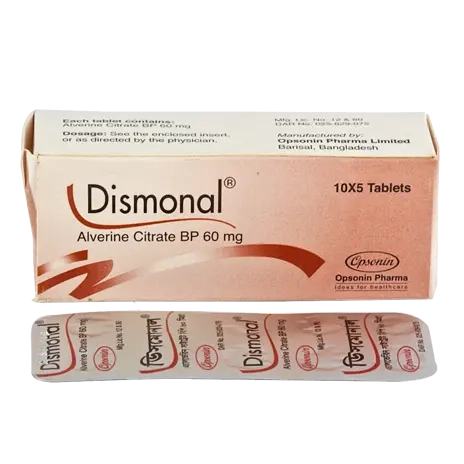Dismonal Uses, Dosage, Side Effects and more
Dismonal Citrate is an anti-spasmodic medicine. It relaxes the muscles in the intestine (gut) and uterus (womb). This helps to stop the pain when the muscles become tense.
Dismonal is a smooth muscle relaxant. Smooth muscle is a type of muscle that is not under voluntary control; it is the muscle present in places such as the gut and uterus. Dismonal acts directly on the muscle in the gut, causing it to relax. This prevents the muscle spasms which occur in the gut in conditions such as irritable bowel syndrome and diverticular disease. Diverticular disease is a condition in which small pouches form in the gut lining. These pouches can trap particles of food and become inflamed and painful. In irritable bowel syndrome the normal activity of the gut muscle is lost. The muscle spasms result in symptoms such as heartburn, abdominal pain and bloating, constipation or diarrhoea. By relaxing the gut muscle, alverine citrate relieves the symptoms of this condition. Dismonal also relaxes the smooth muscle in the womb (uterus). It is therefore also used to treat painful menstruation, which is caused by muscle spasms in the uterus (dysmenorrhea).

| Attribute | Details |
|---|---|
| Trade Name | Dismonal |
| Generic | Alverine |
| Alverine Other Names | Alverina, Alverine, Alverinum, Phenopropamine, Phenpropamine |
| Weight | 60mg |
| Type | Tablet |
| Formula | C20H27N |
| Weight | Average: 281.4351 Monoisotopic: 281.214349869 |
| Groups | Approved, Investigational |
| Therapeutic Class | Anticholinergics |
| Manufacturer | Opsonin Pharma Ltd |
| Available Country | Bangladesh |
| Last Updated: | January 7, 2025 at 1:49 am |
Uses
Dismonal Citrate is used for Irritable Bowel Syndrome (IBS), also can be used for a condition of the large intestine called painful diverticular disease of the colon and to relieve period pains.
Dismonal is also used to associated treatment for these conditions: Abdominal Pain
Dosage
The usual dose is 60-120 mg 3 times a day.
How Long Does It Take to Work?
How Long Does It Take to Work? see here Dismonal
Side Effects
Yellowing of the whites of the eyes and the skin, as inflammation of the liver has been known to occur. Difficulties in breathing, shortness of breath, wheezing, swelling of face or other parts of body. A feeling of sickness or dizziness. Headache. Allergic reactions, which may include itching or skin rash.
Toxicity
Can produce hypotension and atropine-like toxic effects. Fatality has occurred following overdose with very high doses.
Precaution
Aging 40 years or over. Blood passed from the bowel. Feeling sick or vomiting. Having lost appetite or weight
Half Life
The plasma half-life averages 0.8 hours for alverine and 5.7 hours for the active primary metabolite.
Elimination Route
High renal clearance of all metabolites indicating that they are eliminated by active renal secretion.
Pregnancy & Breastfeeding use
The safety of Dismonal Citrate during pregnancy and breastfeeding is not established. It is not recommended for use during pregnancy or breastfeeding.
Contraindication
Hypersensitivity to Dismonal Citrate or any of the other ingredients of the capsule, Having obstruction of the gut.
Special Warning
Dismonal Citrate is not suitable for children under 12 years old.
Acute Overdose
Dismonal Citrate can produce hypotension and Atropine-like toxic effects. Management is as for Atropine poisoning with supportive therapy for hypotension.
Innovators Monograph
Dismonal contains Alverine see full prescribing information from innovator Monograph, MSDS, FDA label



